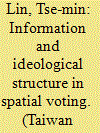| Srl | Item |
| 1 |
ID:
107442


|
|
|
|
|
| Publication |
2011.
|
| Summary/Abstract |
This article aims at unifying the theory of spatial voting and the theory that is
variously called conceptualization, information, or sophistication. Following
Downs's early insights on uncertainty as well as recent developments in both
literatures, I argue that it is of critical importance that spatial voting models
explicitly incorporate information effects. For this purpose, I develop a
heteroskedastic probit model that allows for the specification of information
heterogeneity. This model is applied to the Taiwan Election and Democratization
Study's 2004 post-presidential election survey data. In 2004, Taiwan's political
landscape was dominantly defined by the Green vs. Blue ideological cleavage,
and the candidates were perceived as taking divergent positions. This article
investigates the effects of information and activism on the spatial structure and
their implications on candidates' strategies. My findings confirm the existence
of these effects on voter uncertainty in the framework of spatial analysis.
1
|
|
|
|
|
|
|
|
|
|
|
|
|
|
|
|
| 2 |
ID:
106041


|
|
|
|
|
| Publication |
2011.
|
| Summary/Abstract |
This article revisits the notion of linguistic diversity and its function as a political cleavage. It argues that people's linguistic and cultural attitudes are influenced not only by their communicative practice but also by their identification with particular language(s) - even though they may not always communicate in that language. In Ukraine, from which my empirical data is drawn, language identity is embodied in the concept of native language that was imposed by the Soviet institutionalisation of ethnicity and came to mean ethnic belonging as much as linguistic practice. My analysis of survey data demonstrates that native language is a powerful predictor of people's attitudes and policy preferences with regard to both language use and other socially divisive issues, such as foreign policy and historical memory. This finding should also be applicable to other societies with a large-scale discrepancy between language practice and identity.
|
|
|
|
|
|
|
|
|
|
|
|
|
|
|
|
| 3 |
ID:
093720


|
|
|
|
|
| Publication |
2010.
|
| Summary/Abstract |
Departing from some prominent scholarship on Kazakhstani politics, the author argues that competition between financial-industrial groups over scarce economic and political resources-rather than inter-clan or centre-periphery rivalries-largely determines who gets what, when and how. While clan politics and regional grievances may still influence struggles over the distribution of power and wealth, their importance has diminished in recent years. Instead, observable political conflict has centred around competing financial-industrial groups, which represent the diverse, and at times clashing, interests of Kazakhstan's business and political elites.
|
|
|
|
|
|
|
|
|
|
|
|
|
|
|
|